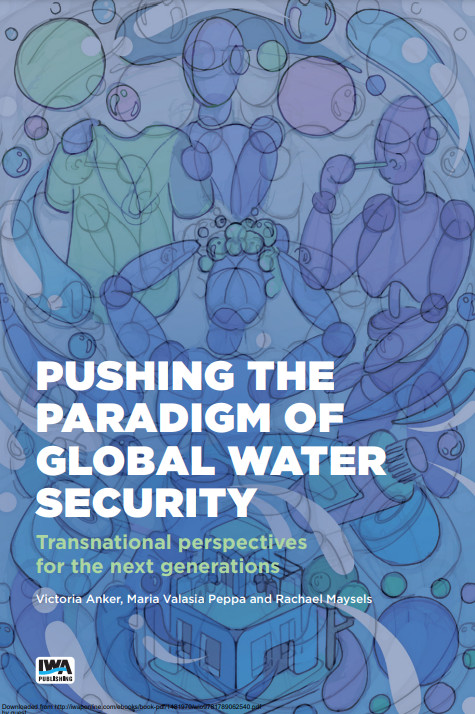Pushing the Paradigm of Global Water Security
 |
publication Sep 2024 ; 269 pages
Ed. IWA - London
Téléchargeable sous format: PdF
Téléchargeable chez l'éditeur
Abstract:
This book brings together early career researchers, non-governmental organisations and industry practitioners, indigenous and local communities, and government agency workers to interrogate the concept of water security. By collating multicultural perspectives, diverse contributions, and illustrative media, we challenge the current anthropocentric, technocratic narrative of water security, according to which: water security is solely for humans; development initiatives and interventions are driven by neocolonial and neoliberal ideologies; the socio-cultural approach to water security is secondary to a technical, engineering-based approach; and interdisciplinarity is not practical in its application.
Presented here is an amalgamation of our personal and professional efforts to address these challenges. The nuance of this book is in our methodology: transnational cooperation, collaboration across disciplines, and diagnostic problem-solving. While we do not promise a single solution (there is no such thing as ‘one size fits all’), we believe this timely contribution broadens the discussion around water security through its firm rejection of reductionist approaches to this most complex of ‘wicked problems’.
Most notably, we push for the radical acceptance of the indivisibility of environmental conservation, social stability, and economic vitality. We resist the temptation of ‘green growth’, recognising it as little more than neoliberalism in disguise. The brilliance, innovation, and recall to tradition that emerge through this book demonstrate the importance of solutions that are informed by a plurality of knowledge types (from scientific and technical to indigenous and local) and generated through collaboration and partnerships to support the attainment of socio-ecological justice.
Essential reading for water practitioners, policy makers, and multilateral organisations in the development sector, it is also a must-read for doctoral and master's students working at intersections of water, and undergraduates who want to challenge their subject-specific perspectives on water and push disciplinary boundaries. Contents:
Introduction . 1
Principle 1 Justice – introduction . 7
Chapter 1 Social justice – recognition and representation . 15
1.1 Associativity for the Recognition of Community Water Management, Colombia . 15
1.2 Access and Justice: An Evaluation of Public Participation in Water and Development Planning in Malaysia . 20
1.3 Social Justice in Water Security Through Systems Performance Assessment: The Cases of Colombia and Palestine . 27
Chapter 2 Social justice – redistribution . 45
2.1 Water Injustice in Slums: A Case Study of Settlements Along Barapullah Drain, Delhi, India . 45
2.2 Untold Stories: Farmers Living Along the Yamuna, Delhi, India . 54
2.3 Social Justice in Water Security Considerations for Urban Agriculture Initiatives: The Case of Shenkora 2 Multi-Purpose Garden in Addis Ababa, Ethiopia . 57
Chapter 3 Ecological justice . 63
3.1 Ecological Justice in the Realm of Peatland Restoration and Carbon Storage in the UK . 63
3.2 Water Heritage from India’s Past . 70
Chapter 4 Socio-ecological justice . 79
4.1 Hidden Voices of Rural Campesino Communities in Colombia and the Need for Socio-Ecological Justice . 80
4.2 Political Leadership of Women in the Upper Cauca River Basin, Colombia . 90
4.3 The Kisgó Community, Colombia: Origins and Practices in Water . 93
Principle 1 Justice – conclusion . 99
Principle 2 Knowledge – introduction . 101
Chapter 5 Data collection . 109
5.1 Multitemporal Analysis for Water Monitoring, Management, and Security from a Remote-Sensing Perspective in Colombia . 109
5.2 Innovative Molecular Microbiology Method for Water Quality Testing and Faecal Pollution Source Tracking: Cases from the UK and Globally . 115
5.3 Exploratory Mixed Methods Design in Practice-Centred Research: Showering in Cali, Colombia .120
Chapter 6 Databases . 131
6.1 Camels-Eth Explorer: Hydrometeorological and Geospatial Interactive Database to Support Water Resource Management in Ethiopia . 131
6.2 Enhancing Climate-Based Information for Johor River Basin, Malaysia: Accessing Data and Overcoming Barriers . 134
Chapter 7 Data modelling . 141
7.1 Understanding Water Security in NCT Delhi, India: Using Qualitative and Quantitative Modelling . 141
7.2 Results . 146
7.3 Leveraging the Power of AI for Building Predictive Models Adaptive to Future Urban Flooding in Addis Ababa, Ethiopia . 150
Chapter 8 Data integration . 159
8.1 Connecting Socio-Ecological and Ecosystem Services in South-Western Colombia . 159
8.2 Understanding Water Pollution and Microbial Hazards to Improve Public Health in Addis Ababa, Ethiopia . 167
Principle 2 Knowledge – conclusion . 171
Principle 3 Collaboration – introduction . 173
Chapter 9 Barriers to collaboration . 179
9.1 Exploring the Complexity of Collaboration for Water Governance in NCT Delhi, India . 179
9.2 Youth in Urban Water Future: Participation, Recognition, and Accountability in NCT Delhi, India . 184
Chapter 10 Consultation . 191
10.1 Stakeholder Engagement: Exploring Multiplicity of Values in Johor River Basin, Malaysia . 191
10.2 Participatory Scenario Development for Water Allocation Modelling and Sustainable Water Management in Ethiopia . 196
Chapter 11 Citizen science . 207
11.1 Education-Driven Crowd-Based Rainfall Observation in Johor River Basin, Malaysia .207
11.2 Leveraging Citizen Science for Urban Flood Management in NCT Delhi, India: The Aab Prahari App . 212
11.3 Community-Based Flood Early Warning Systems in the Akaki Catchment, Ethiopia . 215
Chapter 12 Co-production . 223
12.1 Community-Based Wash Solutions in NCT Delhi, India .223
12.2 Socio-Technical Innovation for Water Quality Data: Information Systems for Rural Community Water Management in Colombia . 223
Chapter 13 Community leadership . 231
13.1 Networks of Collective Care: Cooperation for Conservation in a Colombian Watershed . 231
Principle 3 Collaboration – conclusion . 237
Conclusion . 241
Mot clef: |
Editeur/Diffuseur: |
|
IWA
-
International Water Association - London - Royaume Uni |
En cas de lien brisé, nous le mentionner à communication@pseau.org